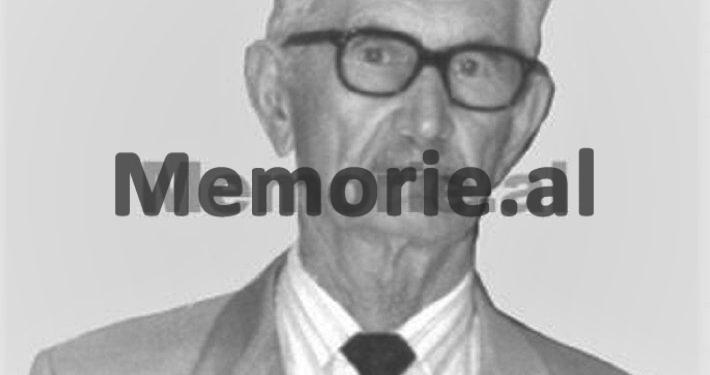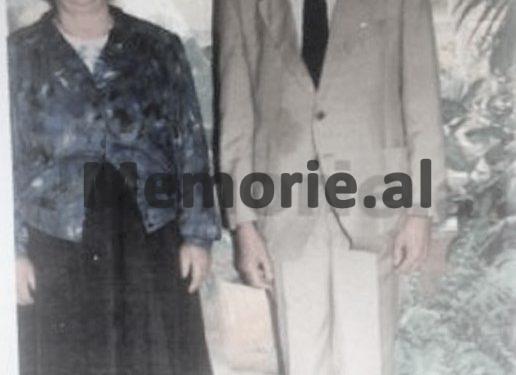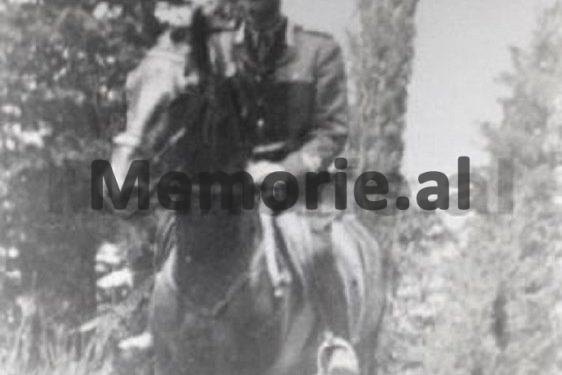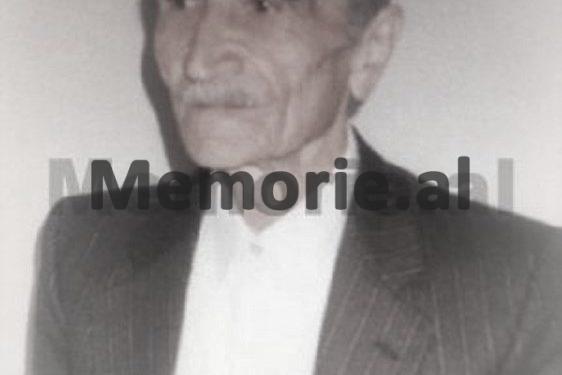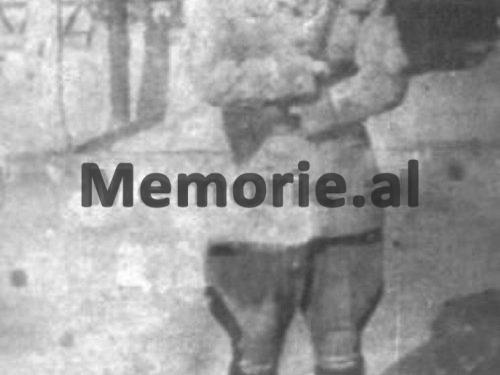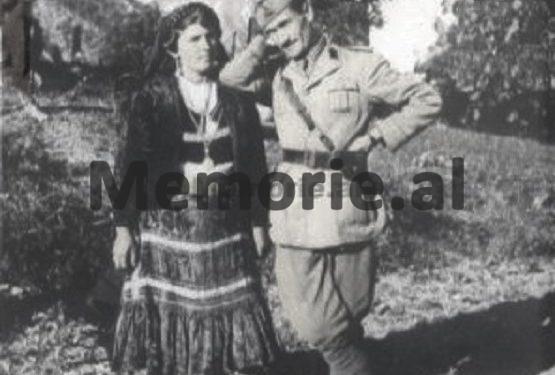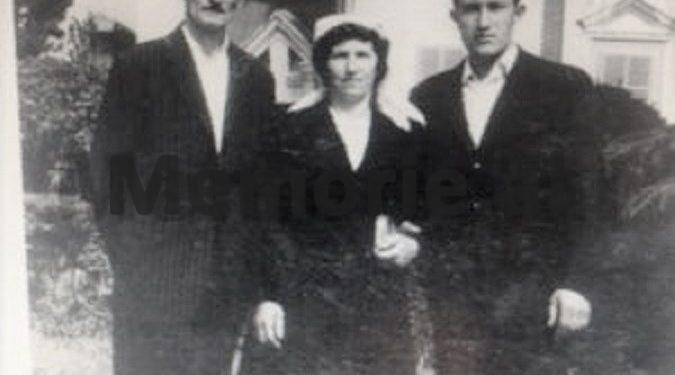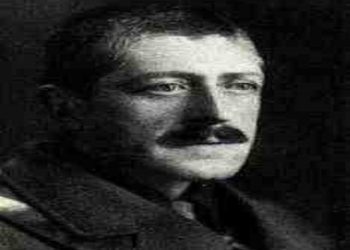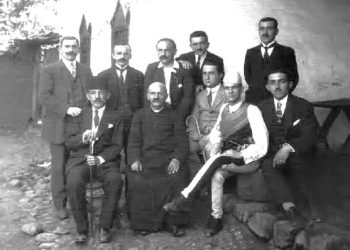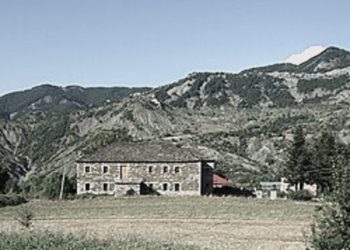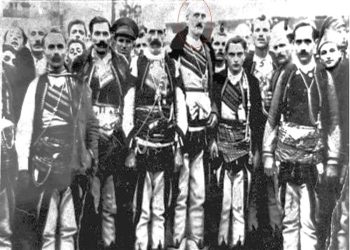Dashnor Kaloçi
Memorie.al publishes the painful story of Lekë Vojvoda, originally from Shoshaj of Dukagjini, who after graduating from the Military Academies of Modena and Florence returned to Albania serving as a circle commander of the Lezha and Tuz Gendarmerie, where he became associated with Anglo-American missions serving in that province under Major Nils. How did he respond to the call of the communist regime in 1945 by surrendering after the amnesty together with Mark Malë, Gjergj Vata, Pal Thani, Lulash Staka, Mirash Ndoun e Gjocaj and the mayor of Dukagjini, Lulash Gjeloshi with all the men of the tribe and the sentence of his years of imprisonment and family internment…?
Around 1944, when I was serving as the commander-in-chief of the Dukagjini gendarmerie, I entered into secret relations with the British Major Nils, who was leading one of the Anglo-American missions that were then attached to the nationalist forces in Northern Albania. According to his orders, I then helped all those forces fighting against the Germans, such as the Communists, the Ballists and the Legalists. In July 1944, I resigned as Tuz district commander and went to Shoshaj, where I was constantly under the anxiety of being beaten and arrested by both partisans and German forces. As a fugitive I stayed for two years hiding in the mountains of Dukagjini together with Mark Malë, Gjergj Vata, Pal Thani, Lulash Staka, Mirash Ndoun and Bajraktar of Dukagjini Lulash Gjeloshi with all the men of the tribe. In October 1946, when the Communist Government of Tirana announced an amnesty for all the fugitives, I decided and surrendered myself along with some other comrades, thinking that the communists would keep their word for the pardon they issued. But I was wrong, that the communists betrayed us and sentenced me to seven years in prison and long internments, from which I was released only in 1984 “. Testifies for the first time for Memorie.al, Lekë Vojvoda from Shoshaj of Dukagjini, former academic officer with the rank of captain graduated in Modena, Florence, who tells the whole story of his life since the gymnasiums of Shkodra, studies in the Italian Academies, the beginning of his military career during the years of occupation, great help to the anti-fascist movement, to the arrest and punishment by the communists of long years of imprisonment and internment. Although endless sufferings and vicissitudes are inextricably intertwined with each other, the noble highlander Lekë Vojvoda, with a portrait and typical physique like those of the knights who has described so masterfully, Padër Gjergj Fishta in “Lahuta e Malcisë”, to surprise you with his memory and the events he tells.In his simple house located in a narrow alley of the neighborhood “Three Heroes” of the city of Shkodra, he begins to confess, recalling events, dates, years and people with different histories and from time to time interrupts his story because he is betrayed by a few tears that fall on him site!
Vojvoda family, loyal to Zog
Lekë Vuksani or as he is otherwise known by the surname Vojvoda, was born on May 7, 1918 in Shoshaj of Dukagjini, where his family is from, one of the most famous of that province in Northern Albania. The surname Vojvoda has been inherited by that family for five generations, as its ancestors were mountaineering commanders in the wars against the Serbo-Montenegrin forces, in the late 19th and early 20th centuries. Leka’s father was called Vuksan Vojvoda and he was known in that province as a wise man for the separation of elders, because together with the Bajraktar of Dukagjini, he also dealt with resolving disputes and various problems that arose between the villagers of that province. . Vuksan Vojvoda was one of the loyalists of the Zog Monarchy and he was known throughout Dukagjini as one of the main supporters of the King. In 1926, when the Dukagjini Uprising took place, led by Lieutenant Ndok Gjeloshi and Dom Loro Caka, who aimed to overthrow the Government of Zog, Vuksan Vojvoda was also called to join the Dukagjini Uprising. The intention of the insurgents to take Vuksan Vojvoda for themselves, lay in the fact that he enjoyed tremendous popularity throughout that province. But Vuksani refused to take part in that uprising, as he was quite clear about its true intentions and organizers. Although Vuksani himself had not attended any major school, he made sure that his son, Lekë, did not miss it. So in 1928, Vuksani sent his son, Lekë, to the city of Shkodra and enrolled him in the elementary school of the Dormitory “Our Mountains”. Lekë Vojvoda finished that school in 1936, when he received his high school diploma and throughout the period, he attended classes there, he was considered one of its best students, as during one school year he took two classes at once. During that period, among Lekë’s closest friends in the “Our Mountains” Dormitory, was Mëhill Marku from Lotaj e Shalës (later emigrated to the USA where he became a professor at a New York university) and Kol Prela (professor who was shot with the group of deputies in 1946) which was several years older than his age. In addition to Mëhilli and Kola, whom he had friends and fellow villagers, in a class with Lekë, at that time also taught Fadil Hoxha, Xheladin Hana, Hajrulla Kastrati, Emin Duraku, Ndue Gjergj Pervizi, etc. Regarding the friends that Leka had in the “Our Mountains” Dormitory, he recalls: “Ndo-if I had a close friendship with these friends, in political convictions I was against them because they had communist views”, Leka testifies about his former friends of the class, who later became well-known names and personalities of the Anti-Fascist War in Albania and Yugoslavia.
In the military school of Rome
After graduating from high school in 1936, Lekë Vojvoda wanted to continue his studies in one of the military schools in Italy. In this regard, he recalls: “After graduating from the secular gymnasium of the city of Shkodra, I made a request to pursue military studies in Italy. served as adjutant to King Zog’s sisters, I participated in the competition that took place in Tirana, I won that competition with full points, I was given the right to attend the military school in Rome, which I started in October 1936. Together with me in that military school of the Italian capital, at that time there were some other students from Albania, such as Abdyl Këllezi, Abdi Mati, Valentin Pervizi etc. I finished the military high school with very good results in 1939, but during “When I was a student there, I went through one of the most painful events of my life,” Leka recalls of this distant story: “On the afternoon of April 8, 1939, I was on the school premises, with only a few friends. Albanians, as the Italians had in going through their homes on the occasion of the feast of Easter. Since in those days we had not gone outside the premises of the silos at all, we had no knowledge of what was happening outside the walls of that school. In the afternoon of that day, I went out and met the school chaplain (military priest) whom I told that my two friends and I wanted to go to church on the occasion of the Easter holidays. The chaplain, after listening to me, replied: “You will not be able to go to church because there is great unrest in the city, because these days the unification of Italy with Albania has taken place”. I immediately understood what had happened, since by the end of March we had heard that something was expected to happen between Italy and our homeland Albania. Immediately after the words of the upset chaplain, I addressed you, saying: “Father, from this moment on, I no longer believe. How is it possible for a large state to occupy another smaller state? Is not our homeland Albania one “a country that God has forgiven like all other countries? Why don’t we have the right to live free too?” “After my words, the chaplain did not feel at all and left the school, while my friends and I entered the barracks”, Lekë Vojvoda recalls that distant event of April 7, 1939.
Rejection of the military oath in Rome
What happened next to Leke Vojvoda and his fellow military students who were then studying at the Military Lyceum in Rome? In this regard, he confesses: “Since the morning of April 9, 1939, in the premises of our school in Rome, the Italian authorities began to gather all the Albanian students who were then in other military schools in Italy, both high school and The purpose of that gathering was that they had decided to send us to take the military oath together with the Italian students. While the gathering of Albanian students was going on in our school premises, we who were there decided that After secretly gathering about 20 or so Albanians in a class, we started discussing what to do in the situation we were in. At first, they rejected the idea that we should leave school altogether and return to Albania, which at first was unanimously supported by all, but this decision was later rejected because someone n ga we said that it would be better for us to continue school, graduate and wherever they take us to work for the good of Albania. This was supported by all, saying that it would be better to finish school and become officers, as Albania needed capable cadres to lead the Albanian army itself. After this decision we dispersed without knowing that in a few days the Italians would send us to take the military oath. The high Italian authorities had decided that together with the Italian students, they would take us, the Albanians who were studying at that military high school in Rome, to take the oath with a weapon. A military barracks was set up to carry out the military oath, not far from our school, and shortly after we arrived, high Italian military authorities arrived to assist in the swearing-in ceremony. When our national anthem began to be sung, we Albanian students who were lined up in separate squares, began to cry and as if in command we all dropped our weapons on the ground. This also caused the entire swearing-in ceremony to be canceled. After that we were sent back to our school and there, we were gathered in a hall demanding accountability for why we boycotted the military oath. All the Albanian students who stood up to give an account there before the Italian military authorities of the school, gave various reasons regarding the breaking of the oath ceremony. At the end of the meeting, the school command informed us that it would gather to take measures against us and the next day they took and interned only our friend Abdyl Këllez, whom they considered the organizer of everything that had happened “.
Graduation in Modena, Florence
At the end of the spring of 1939 Lekë Vojvoda graduated with honors from the military school of Rome and then he continued his studies at the Military Academy of Modena. He says: “After graduating from the Military Lyceum in Rome, I wanted to continue my studies again in one of the Italian Academies in the Carabinieri branch. But even though I had finished with high results, it was difficult and I was not sure if I was given the right to continue the Academy of Modena. At that time I had a meeting with General Zef Serreqi, who was the Commander of the Italian Cavalry. After he received me well enough, I told him that I had gone to ask him for help to give me the opportunity to study at the Academy of Modena, in the branch of Carabinieri.General Serreqi, after listening to me attentively until the end, at first asked me why I insisted on going to the branch of Carabinieri, at a time when it was one of the most difficult and problematic branches when you came to life after graduation. I replied that I wanted to graduate in that branch, thinking that one day Italy would leave Albania and we Albanian officers would organize it nim and we would take over the formation of the gendarmerie weapon ourselves. “After that, General Serreqi helped me to register and start my studies at that academy, where my close friend Valentin Pervizi, originally from Skuraj i Kurbinit, was with me, also in another branch, that of the Cavalry”. /Memorie.al
Continues tomorrow




